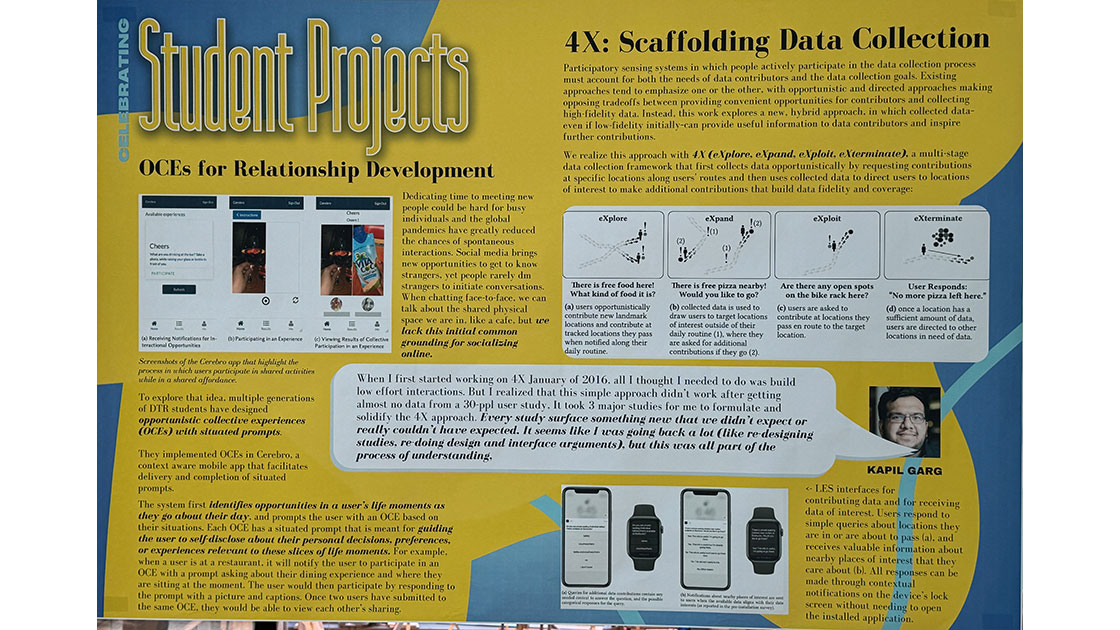Celebrating 10 Years of DTR’s Self-Directed Learning Community
A week of public events marks the success and growth of Haoqi Zhang’s Design, Technology, and Research program
Haoqi Zhang’s dog, Stella, is 10 years old.
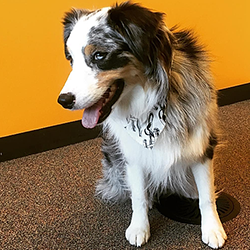
A fast-paced, multiple-quarter course, DTR is structured around students understanding how to learn by self-directing their own independent research projects within a supportive community of peers and mentors, including Delta Lab faculty member Nell O'Rourke and CollabLab director Darren Gergle— and Stella, who is often on campus to offer support and cuddles.
Over the last decade, 160 DTR students — 139 undergraduates, nine master’s degree students, and 14 PhD students — have led more than 70 research projects, publishing 30 papers and extended abstracts at top research conferences. Seven DTR students won Association for Computing Machinery undergraduate student research competitions.
“What's really special about DTR is not those outcomes, but the profound learning and growth of our students,” said Zhang, associate professor of computer science at the McCormick School of Engineering. “Students in DTR learn planning, help seeking, reflection, critical thinking, whole-brain thinking, and collaboration — the stuff that we all need as we go out and face the really complex challenges in the world. Our students become resilient, lifelong learners, both in and out of the workplace.”
In celebration of the 10-year anniversary of DTR, Haoqi Zhang and DTR students Jackie He, Linh Ly, Grace Wang, and Shirley Zhang organized a week-long series of public events May 28 – June 4, which featured an art installation in the Ford Motor Company Engineering Design Center, a screening of the 2022 DTR documentary Forward: A Story About Learning and Growth, and a panel of esteemed program alumni at DTR’s headquarters in The Garage at Northwestern University.
Driving inquiry on an uncharted path
DTR aims to teach students to be more comfortable with not knowing the answers; managing uncertainty, risk, and struggles; and forging ahead on an uncharted path of research and discovery.
The art exhibition “Uncharted Path: Celebrating 10 Years of Design, Technology, and Research” explored how students in DTR learn to lead research projects while also learning about their own work processes and metacognitive blockers, culminating in both project progress and personal growth over time.
Haoqi Zhang and Wang, a rising fourth-year student in computer science at Northwestern’s Weinberg College of Arts and Sciences, guided a curated walk-through of the exhibit on May 28.
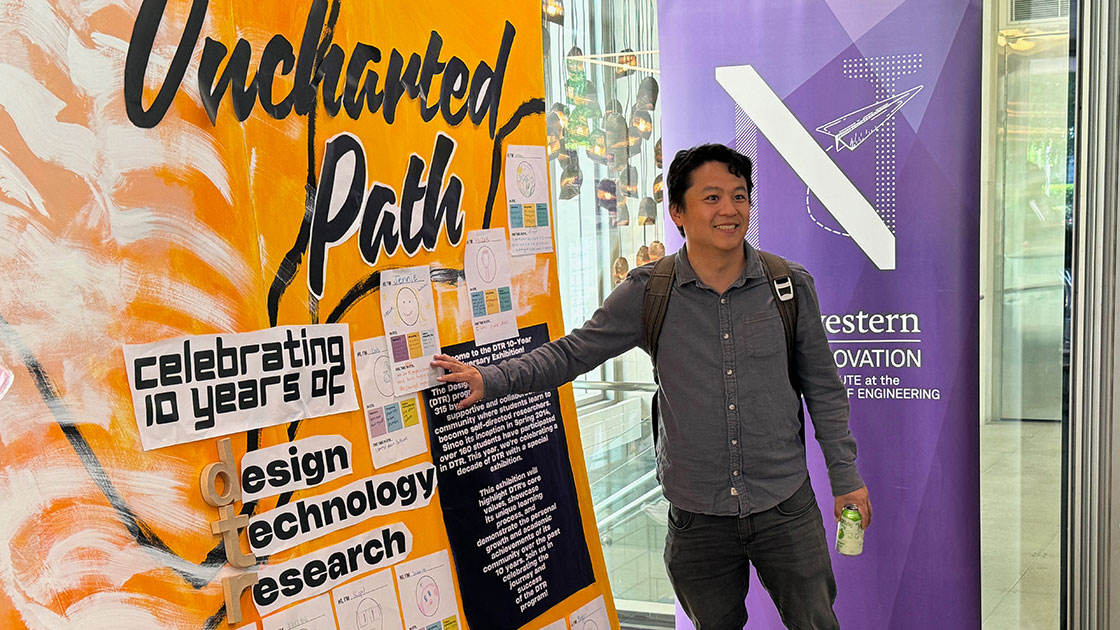
Wang is creating a tool to support mentors in DTR and aid their efforts to help their students overcome blockers. Wang shared her experience pivoting her focus after her original progress check-in project idea was unsuccessful.
“We thought it would work, but after a very painful round of user study, we learned that it wasn’t helpful at all,” Wang said. “The process raised so many more questions for us to answer, like how exactly can we design a computer system that help mentors ask important questions to understand the deeper struggles of their students?”
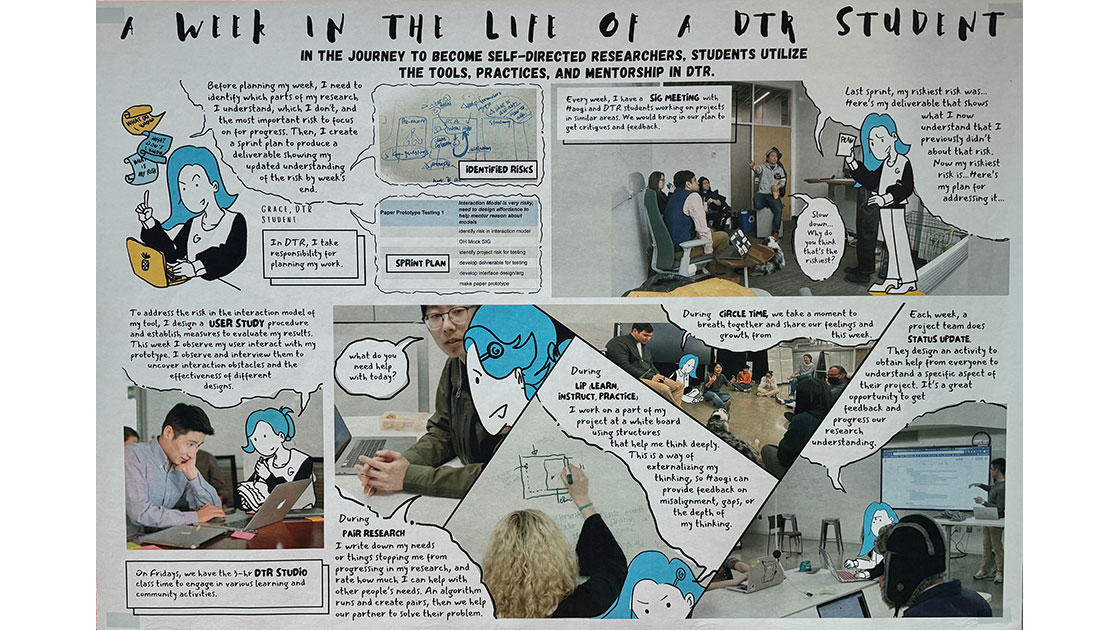
DTR students work with a mentor to identify a direction of research, explore and iterate over designs, prototype at varying fidelities, build working systems, conduct evaluative studies, and report findings through conference publications. As a cohort, each week students demo their prototypes, provide and receive feedback, and help each other resolve technical challenges. DTR adapts and extends agile development and design-based research practices with scrums, sprints, studio critique, design logs, and pair research.
“Students are driving everything and at the same time, they're externalizing and sharing their thinking,” Zhang said. “Students are learning how to be effective independently with the support of a whole community.”
Enduring impact
The DTR learning experience has a lasting and powerful impact on students’ personal and professional life, as reflected in the memories, values, and purposeful career paths of the program alumni.
On May 31, Jackie He, a master’s degree student in computer science at Northwestern Engineering, moderated a panel of nine DTR alumni, of which four — Zak Allen (’16), cofounder and chief technology officer of Homemade; Kevin Chen (’16), software engineer at Hidden Road; Corey Grief (BS/MS ’16), senior software engineer at Microsoft, and Nicole Zhu (’16), engineering manager at The New York Times — were among the first cohort of DTR students in 2014.
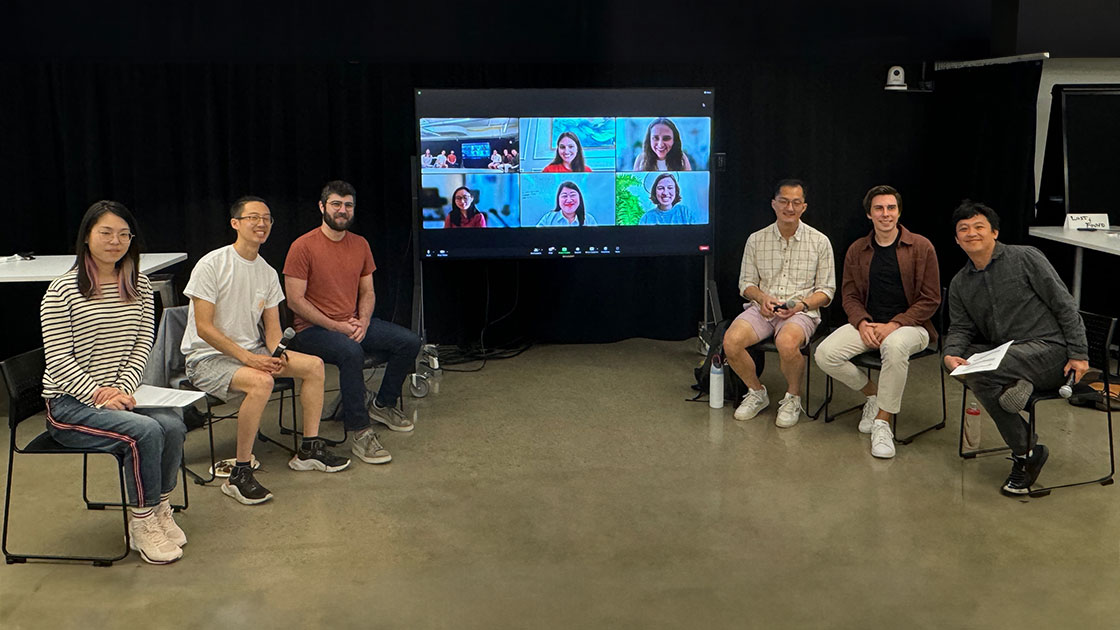
The alumni shared how DTR still reverberates in their lives and highlighted the directly transferable skills they gained, including confidently approaching unstructured problems, offering and receiving feedback, wearing many different hats at a startup, and appreciating the incrementality of progress.
“DTR gave me the most life skills of any course at Northwestern,” said Roxy Wilcox (’22), software engineer at Google. “The skills I learned from DTR — like how to identify and think about problems, conducting user research, iterating and scrappy prototyping — have differentiated me in the software engineering field.”
Victoria Cabales (’19), software engineer at Apple, noted that DTR was her first training ground in long-term accountability, a sentiment echoed by Maxine Whitely (’18).
“Seeing things through and struggling with the same problem for multiple academic quarters really models a lot of the commitment that's required in a professional context,” said Whitely, the cofounder and chief operating officer of Otto Health.
The panelists also discussed how building community and a culture of mutual support in DTR has continued to influence their approach as leaders, managers, and team members.
“Now, as a manager, I think about product, people, and process,” Zhu said. “Asking hard questions or being prepared to answer the hard questions has been something I've carried into my management practice. I really try to model how you can offer candid feedback and be very direct while still caring personally about the people you work with.”
“I joined my current startup to work on a mission that mattered,” said Jennie Werner (’18), a product manager at Afresh. “I actually found in reflection that it was working with people that energized me and mattered a lot more than the end goal.”
Werner was coached by Ryan Louie (PhD ’23), who served as head of DTR’s opportunistic collective experiences special interest group through Northwestern’s PhD in Technology and Social Behavior program. DTR provided Louie with a unique opportunity to both mentor others and learn more about himself.
“During quarterly meetings with our mentors, we talked about our growth and the metacognitive challenges we faced,” Louie said. “It was an opportunity to learn about myself in ways that I just couldn't delve into had I just focused on the research.”
Louie, currently a postdoctoral researcher at Stanford University, is adapting DTR’s ethos to help build community among his new team.
DTR beyond Northwestern
The research learning model Zhang pioneered has spread to more than 70 faculty from institutions including Harvard University, MIT, New York University, University of California San Diego, the University of Michigan, and the University College London through the Agile Research University program, which spreads the Agile Research Studios model for research training developed through DTR to train groups of students to conduct independent research and produce research outcomes.
Looking ahead twenty years to the thirtieth anniversary of the program, Zhang hopes that what seems special about DTR now will become ordinary.
“I hope that's just what the world looks like — that we're all embracing learning and growing, especially in our learning spaces on campus,” Zhang said.

